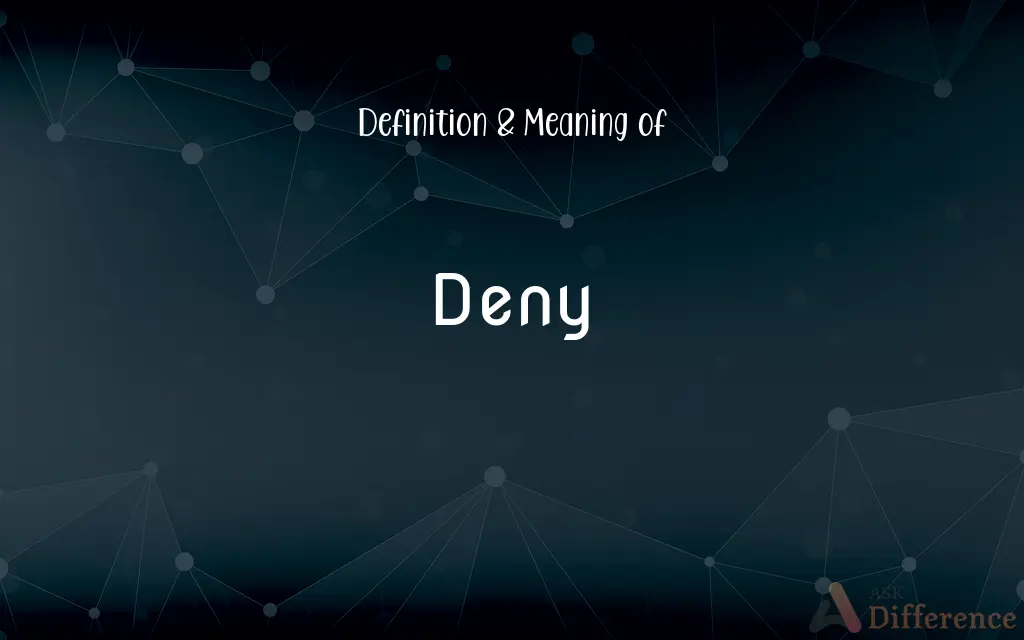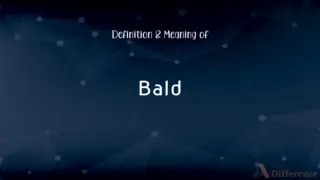Deny Definition and Meaning
By Tayyaba Rehman & Fiza Rafique — Updated on March 5, 2024
"Deny" means to declare something to be untrue, refuse to admit or acknowledge, or withhold something desired. e.g., He chose to deny the allegations against him.

Table of Contents
Deny Definitions
Deny means to state that something is not true.
She denied breaking the vase.
Deny denotes withholding something requested or desired.
They were denied entry to the club.
Deny signifies not admitting to a fact or belief.
He denied ever meeting her.
Deny conveys the act of saying no to a request.
The teacher denied his request to leave early.
Deny implies rejecting a claim or accusation.
The company denied any wrongdoing in the case.
Deny refers to declining to fulfill or satisfy a need.
The drought denied the crops necessary water.
To declare untrue; assert to be false
"A senior officer denied that any sensitive documents had been stored there" (Scott Ritter).
To refuse to believe; reject
Deny the existence of evil spirits.
To refuse to recognize or acknowledge; disavow
The official denied any wrongdoing.
To decline to grant or allow; refuse
Deny the student's request.
Denied the prisoner food or water.
To give a refusal to; turn down or away
The protesters were determined not to be denied.
To restrain (oneself) especially from indulgence in pleasures.
(transitive) To disallow or reject.
I wanted to go to the party, but I was denied.
(transitive) To assert that something is not true.
I deny that I was at the party.
Everyone knows he committed the crime, but he still denies it.
(ditransitive) To refuse to give or grant something to someone.
My father denied me a good education.
To take something away from someone; to deprive of.
To prevent from scoring.
To disclaim connection with, responsibility for, etc.; to refuse to acknowledge; to disown; to abjure; to disavow.
(obsolete) To refuse (to do or accept something).
To declare not to be true; to gainsay; to contradict; - opposed to affirm, allow, or admit.
To refuse (to do something or to accept something); to reject; to decline; to renounce.
To refuse to grant; to withhold; to refuse to gratify or yield to; as, to deny a request.
Who finds not Providence all good and wise,Alike in what it gives, and what denies?
To some men, it is more agreeable to deny a vicious inclination, than to gratify it.
To disclaim connection with, responsibility for, and the like; to refuse to acknowledge; to disown; to abjure; to disavow.
The falsehood of denying his opinion.
Thou thrice denied, yet thrice beloved.
Let him deny himself, and take up his cross.
To answer in negative; to declare an assertion not to be true.
Then Sarah denied, saying, I laughed not; for she was afraid.
Declare untrue; contradict;
He denied the allegations
She denied that she had taken money
Refuse to accept or believe;
He denied his fatal illness
Refuse to grant, as of a petition or request;
The dean denied the students' request for more physics courses
The prisoners were denied the right to exercise for more than 2 hours a day
Refuse to let have;
She denies me every pleasure
He denies her her weekly allowance
Deny oneself (something); restrain, especially from indulging in some pleasure;
She denied herself wine and spirits
Deny formally (an allegation of fact by the opposing party) in a legal suit
Refuse to recognize or acknowledge;
Peter denied Jesus
Deny refers to refusing to grant or give something.
The bank denied his loan application.
Deny means to refuse to acknowledge a connection with.
She denied having any involvement in the scheme.
Deny suggests disallowing someone's right or privilege.
He was denied the chance to compete.
Deny indicates to negate the existence or truth of something.
The witness denied seeing the accident.
Deny Snonyms
Disclaim
To deny any claim to; disavow.
She disclaimed any knowledge of her husband's whereabouts.
Repudiate
To refuse to accept; disown, renounce or deny support.
He repudiated the allegations made against him.
Disavow
To deny any responsibility or support for.
The politician disavowed any connection to the scandal.
Reject
To dismiss as inadequate, unacceptable, or faulty.
She rejected their offer.
Rebuff
To reject (someone or something) in an abrupt or ungracious manner.
His advances were rebuffed with a stern no.
Decline
Politely refuse (an invitation or offer).
He declined the invitation to the party.
Contradict
To assert the opposite of a statement made by (someone).
She contradicted his claim with clear evidence.
Disown
To refuse to acknowledge or maintain any connection with.
He disowned his past mistakes.
Refuse
To indicate or show that one is not willing to do something.
He refused to answer the question.
Negate
To nullify; make ineffective or invalid.
His response was meant to negate the previous statement.
Deny Idioms & Phrases
Deny the facts
To refuse to accept the truth or reality of a situation.
No matter how much he tries, he can't deny the facts of the case.
Deny oneself
To refrain from satisfying one's own needs or desires.
She chose to deny herself sweets during her diet.
Flat deny
To refuse or disclaim something completely and unequivocally.
He flat denied any involvement in the scandal.
Cannot deny
Unable to refute or disagree with something.
You cannot deny the effectiveness of the new policy, seeing the results.
Deny access
To refuse someone the right or opportunity to enter or use something.
The security system was set up to deny access to unauthorized users.
Deny outright
To completely and immediately refuse or reject something.
The proposal was denied outright by the board.
Beyond deny
Something so evident or obvious that it cannot be denied.
The talent of the young musician was beyond deny.
Deny ignorance
To refuse to plead ignorance as an excuse.
The law does not allow one to deny ignorance as a defense.
Deny responsibility
To refuse to accept blame or accountability for something.
The company quickly denied responsibility for the environmental damage.
Deny the possibility
To refuse to acknowledge that something could happen.
The scientist denied the possibility of such a result from the experiment.
Deny oneself of
To voluntarily give up something or abstain from it.
He decided to deny himself of any luxury expenses to save money.
Deny a claim
To refuse to acknowledge the validity of a request, demand, or statement.
The insurance company denied the claim due to insufficient evidence.
Live in deny
To exist in a state of refusal to acknowledge reality or truth.
He seems to live in deny about the seriousness of the environmental issues.
Deny in disbelief
To refuse to believe something is true.
They denied in disbelief when they heard the news of the sudden tragedy.
Deny at every turn
To consistently refuse or contradict at every opportunity.
Despite the mounting evidence, he denied at every turn.
Deny all charges
To refute every accusation or allegation made against oneself.
The politician denied all charges of corruption during the trial.
Deny the obvious
To refuse to acknowledge something clearly true.
It's fruitless to deny the obvious, especially when the evidence is right in front of you.
Deny under oath
To formally and legally declare something as untrue.
The witness denied under oath that she had seen the accused at the scene.
Deny with conviction
To assert one's non-involvement or disagreement with strong confidence.
She denied the accusations with conviction.
Never deny
To always affirm or agree to something.
He would never deny a request from his close friends.
Deny Example Sentences
The suspect chose to deny all the accusations during the interview.
She couldn't deny feeling a bit nervous before her speech.
He had to deny the request for extra dessert.
She would often deny being tired, even when she was clearly exhausted.
He tried to deny his responsibility for the broken window.
She didn't deny that she had forgotten to do her homework.
The teacher had to deny permission for the class to leave early.
The company decided to deny the rumors about its new product.
They had to deny access to the construction site for safety reasons.
The goalkeeper managed to deny the opposing team a goal.
The museum had to deny entry after reaching maximum capacity.
He couldn't deny the evidence presented against him.
She had to deny her friend's invitation because she was busy.
He could not deny the fact that he was lost.
The store manager had to deny the customer a refund without a receipt.
Common Curiosities
How is deny used in a sentence?
Deny is used as a verb, e.g., "He chose to deny the allegations against him."
How do we divide deny into syllables?
Deny is divided into syllables as de-ny.
How many syllables are in deny?
There are 2 syllables in "deny."
Why is it called deny?
It is called deny from the Old French word "denier," and the Latin word "denegare," meaning to refuse or say no.
What is the pronunciation of deny?
Deny is pronounced as /dɪˈnaɪ/.
What is the root word of deny?
The root word of deny is the Latin word "denegare."
What is another term for deny?
Another term for deny is "refuse" or "reject."
What is a stressed syllable in deny?
In the word "deny," the second syllable "ny" is stressed.
What is the second form of deny?
The second form is "denied" (past tense).
What is the verb form of deny?
Deny itself is the base form of the verb.
Which determiner is used with deny?
As a verb, deny typically doesn't use determiners. When used as a noun, as in "the deny was strong," determiners like "a," "an," or "the" may be used.
What is the first form of deny?
The first form is "deny" (present tense).
Is the deny term a metaphor?
The word "deny" itself is not a metaphor, but it can be used metaphorically depending on the context.
Is the word deny imperative?
Deny can be used in the imperative form, e.g., "Deny access to unauthorized users."
Is the word deny Gerund?
The gerund form of deny is "denying."
Is the word “deny” a Direct object or an Indirect object?
"Deny" is a verb and can act upon a direct object, e.g., "She denied the claim."
What is the third form of deny?
The third form is "denied" (past participle).
What is the plural form of deny?
Deny does not have a plural form; verbs do not have plural forms.
What is the opposite of deny?
The opposite of deny could be "affirm," "confirm," or "acknowledge."
Is deny an adverb?
No, deny is not an adverb; it is a verb.
Is deny a collective noun?
No, deny is not a collective noun; it's a verb.
Which vowel is used before deny?
Vowels are not typically used before verbs like deny.
Which conjunction is used with deny?
Conjunctions are not specific to the word "deny" and depend on the sentence structure. Examples include "and," "but," or "or."
What part of speech is deny?
Deny is a verb.
What is the singular form of deny?
Deny does not have a singular form as it is a verb, not a noun.
Is deny a noun or adjective?
Deny is a verb, not a noun or adjective.
Is deny an abstract noun?
No, deny is not a noun; it is a verb.
Is deny a negative or positive word?
Deny is generally considered a negative word as it involves the refusal or rejection of something.
Is deny a countable noun?
Deny is not a noun; it is a verb and therefore not countable.
Which article is used with deny?
Articles are typically not used directly with verbs like "deny." When used as a noun in a phrase like "a deny of access," the article "a" or "the" may be used.
Is deny a vowel or consonant?
The word "deny" starts with a consonant.
Which preposition is used with deny?
Prepositions used with "deny" vary based on context, like "deny of rights" or "deny to the accused."
Share Your Discovery

Previous Term
Bald Definition and Meaning
Next Term
Damp Definition and MeaningAuthor Spotlight
Written by
Tayyaba RehmanTayyaba Rehman is a distinguished writer, currently serving as a primary contributor to askdifference.com. As a researcher in semantics and etymology, Tayyaba's passion for the complexity of languages and their distinctions has found a perfect home on the platform. Tayyaba delves into the intricacies of language, distinguishing between commonly confused words and phrases, thereby providing clarity for readers worldwide.
Co-written by
Fiza RafiqueFiza Rafique is a skilled content writer at AskDifference.com, where she meticulously refines and enhances written pieces. Drawing from her vast editorial expertise, Fiza ensures clarity, accuracy, and precision in every article. Passionate about language, she continually seeks to elevate the quality of content for readers worldwide.




































